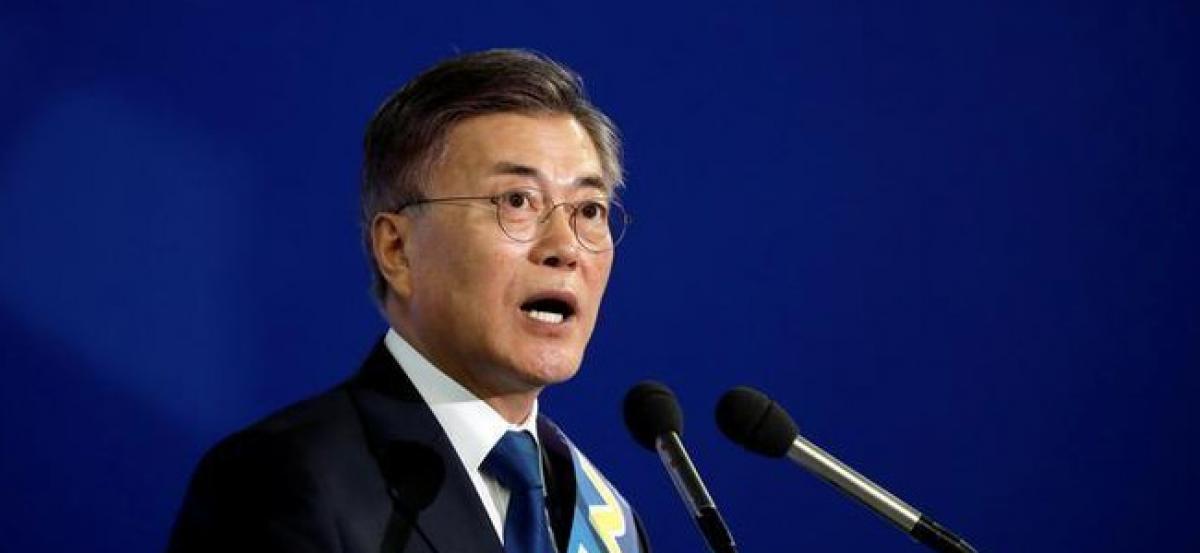Live
- Govt plans to establish offshore Johns Hopkins University Campus in India
- Goa Aces clinch Indian Racing League title
- Study finds how hormone therapy can reshape the skeleton
- High-street fashion players looking at India for manufacturing: Report
- Shreyas Iyer to lead Mumbai as Prithvi Shaw returns for Syed Mushtaq Ali Trophy
- 'Failed to resolve crisis': NPP withdraws support from BJP govt in Manipur
- Chennai: Actress Kasturi Remanded in Custody Until 29th of This Month
- Aaqib Javed likely to become Pakistan's new white-ball head coach
- BJP panel to draft poll charge sheet against AAP govt in Delhi
- Allu Arjun Thanks Fans in Patna, Teases 'Pushpa 2' Release
Just In

South Korean human rights lawyer Moon Jae-in never felt comfortable being at the Blue House when he was a top aide to the president. He quit in 2004, a year into the job, and went on a long hike in the Himalayas.
SEOUL: South Korean human rights lawyer Moon Jae-in never felt comfortable being at the Blue House when he was a top aide to the president. He quit in 2004, a year into the job, and went on a long hike in the Himalayas.
Although he would return to the presidential office a month later, the liberal idealist, who once dreamed of opening a pro-bono law practice in a Korea reunified with the North, says he has always been uneasy in the limelight.
Now he has the eyes of 51 million South Koreans on him after exit polls projected that he won a Tuesday election to succeed the ousted Park Geun-hye as president.
Moon favours dialogue with North Korea to ease rising tension over its accelerating nuclear and missile programmes. He also wants to reform powerful family-run conglomerates, such as Samsung and Hyundai, and boost fiscal spending to create jobs.
Recalling his life at the Blue House in 2003-2008, he said in his 2011 book "Destiny": "I always felt uncomfortable. I felt that the job was not suitable for me, as if I was wearing clothes that did not fit. I always thought 'I will go back to my place, a lawyer'."
A close confidant and a top aide to former liberal President Roh Moo-hyun, Moon said it was his old friend's apparent suicide in 2009 amid a bribery investigation into his family after his term in office ended, that drew him into electoral politics, and eventually a run for the highest office.
Moon was born on Jan. 24, 1953, during the Korean War, on Geoje island off the southern tip of the peninsula. His parents had fled from the North during the war, sailing for three days on the deck of a U.S. ship packed with refugees.
“I was thinking I wanted to finish my life there in Hungnam doing pro-bono service," he said in his book published in January, referring to his parents' hometown on North Korea's east coast.
"When peaceful reunification comes, the first thing I want to do is to take my 90-year-old mother and go to her hometown."
'NERDY STYLE'
As a law student in the 1970s, he was jailed twice during pro-democracy protests against the dictatorship of Park Chung-hee - father of Park Geun-hye - and his successor, Chun Doo-hwan.
He was released from jail after passing a state bar exam.
As a conscript in South Korea's special forces, Moon was part of mission that responded after North Korean troops murdered an American soldier with an axe in the demilitarised zone in 1976.
Moon joined Roh's law practice in Busan city in 1982, defending democracy and labour activists during the rule of authoritarian military presidents.
"Moon had a distinctively nerdy style, reviewing papers after papers quietly as he prepared for court cases," Seol Dong-il, who worked with Moon and Roh at the law firm, told Reuters.
"When workers sought advice from him, Moon used to sit down for hours to listen to them."
Moon cut short his trek in the Himalayas in 2004 when he read news in Nepal that parliament had passed an impeachment motion against Roh for allegedly violating election campaign laws.
He returned to join a team of lawyers who successfully argued Roh's case at the Constitutional Court, which overturned the motion.
GLASS OF SOJU
Moon helped Roh open the inter-Korean Kaesong Industrial Park in 2004 and helped him prepare for a rare summit with then North Korean leader Kim Jong Il in 2007.
North Korea's official media have not mentioned Moon by name but said it was time to deal the conservatives a crushing election defeat so the two Koreas could put a period of confrontation behind them.
“We should end the history of North-South confrontation that has been continued by the puppet conservative group, and we as the same race should gather our strength to open a new era of independent reunification," the North's official Rodong Sinmun newspaper said on Monday.
On the campaign trail during 2004 parliamentary elections, a "very shy" Moon cut a "ridiculously awkward" figure, recalled former politician Choi Nak-jeong.
Moon himself entered politics in 2012, winning a parliamentary seat in Busan, Roh's old political base. Later that year, he ran for president, losing to Park by a slim margin.
Moon faulted Park Geun-hye for being walled off from the public, and has pledged to turn the Blue House into a "resting space for the people". He says he will work instead out of a 19-storey government building in central Seoul.
"I will be a president that can share a glass of soju with the public after work," he told reporters in April, referring to South Korea's vodka-like liquor.
Moon, a Catholic, is married with a son and a daughter.
Graphic: S.Korea's presidential election tmsnrt.rs/2p0AyLf
App for Eikon users on S.Korea's presidential election (paste in search window) cpurl://apps.cp./cms/?navid=36988
Election demographics tmsnrt.rs/2pGD25v

© 2024 Hyderabad Media House Limited/The Hans India. All rights reserved. Powered by hocalwire.com







